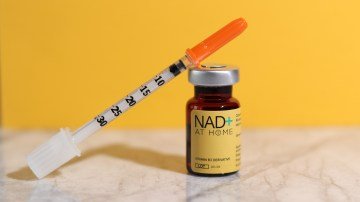In recent years, NAD injections have gained considerable attention for their potential to boost energy, improve mental clarity, and slow down the effects of aging. However, as with any medical treatment, people are left wondering: Are NAD injections safe? Understanding the benefits, risks, and side effects associated with NAD+ (Nicotinamide adenine dinucleotide) injections is crucial to making an informed decision about their use. This article aims to provide you with a comprehensive analysis of NAD injections safety, their side effects, and what you need to know before considering this treatment.
What Are NAD Injections?
NAD injections involve the administration of a solution containing NAD+, a vital coenzyme found in every cell of the body. NAD+ plays a crucial role in several important processes, including energy production, DNA repair, and maintaining cellular health. As we age, NAD+ levels naturally decline, which has led to the exploration of NAD injections as a potential way to replenish these levels and counteract the effects of aging and chronic health issues.
NAD+ injections typically deliver the coenzyme directly into the bloodstream, ensuring faster absorption and utilization by the body. These injections have been used for a variety of purposes, including:
-
Improving mental clarity and focus
-
Boosting energy levels
-
Supporting addiction recovery
-
Reducing symptoms of chronic fatigue
-
Promoting cellular repair and slowing aging
While the potential benefits are alluring, it’s important to explore the safety and risks involved before opting for NAD injections.
Are NAD Injections Safe?
The question of whether NAD injections are safe is one that should be addressed with careful consideration. Although NAD+ is a naturally occurring substance in the body, administering it through injections can have side effects and risks that should not be overlooked.
Scientific Backing
There is a growing body of research supporting the potential benefits of NAD+ for various health conditions. Studies have shown that NAD+ is essential for cellular metabolism and energy production. Additionally, some research suggests that boosting NAD+ levels can improve mitochondrial function, which is key to overall health and longevity. For instance, a study published in Cell Metabolism demonstrated that increasing NAD+ levels in animals led to enhanced physical performance and improved overall health.
However, much of the research on NAD+ is still in its early stages, and more studies are needed to establish the long-term effects and safety of NAD injections. The fact that NAD+ is essential to life does not automatically mean that injecting it directly into the bloodstream is without risks.
Regulation and Quality Control
Another factor in the safety of NAD injections is the regulation and quality control of the products being used. In many countries, including the U.S., NAD+ injections are not strictly regulated by the Food and Drug Administration (FDA) for use outside of clinical trials or research settings. This means that there may be variability in the quality and potency of NAD+ solutions, which could lead to risks if the product is not properly formulated or administered.
Moreover, the lack of standardization in the preparation of NAD+ injections means that patients may not always know the exact concentration of NAD+ being injected, increasing the risk of side effects or ineffective treatment.
Potential Risks and Side Effects of NAD Injections
As with any medical procedure, NAD injections carry the risk of potential side effects. While some people may experience little to no adverse effects, others may face more significant issues. Let’s take a closer look at the potential side effects and risks of NAD injections:
Common Side Effects
-
Injection Site Reactions: One of the most common side effects of NAD injections is pain, redness, or swelling at the injection site. These reactions are generally mild and temporary but can be bothersome for some individuals.
-
Headaches: Some people report experiencing headaches after receiving NAD injections. This may be due to the rapid increase in NAD+ levels, which could cause changes in blood flow or neural activity in the brain.
-
Fatigue: While NAD+ is often touted for its energy-boosting properties, some individuals may experience fatigue or a “crash” after receiving the injection. This can happen as the body adjusts to the increased levels of NAD+.
-
Nausea: Nausea and digestive discomfort are also common side effects. This may occur as a result of changes in the body’s metabolism or as a reaction to the injection itself.
-
Dizziness: Some individuals may feel lightheaded or dizzy, especially if they have low blood pressure or an underlying health condition.
Less Common and Severe Side Effects
While the following side effects are less common, they can be more serious and warrant immediate medical attention:
-
Allergic Reactions: As with any injection, there is a risk of an allergic reaction. Symptoms may include difficulty breathing, swelling of the face or throat, and a rash. If any of these symptoms occur, it is essential to seek emergency medical attention immediately.
-
Electrolyte Imbalance: In rare cases, NAD injections can cause an electrolyte imbalance, leading to symptoms like muscle cramps, confusion, or irregular heartbeat. This is more likely if the injection is administered too quickly or in excessive doses.
-
Increased Risk for Those with Kidney or Liver Disease: People with pre-existing kidney or liver conditions may be at a higher risk for complications when receiving NAD+ injections. This is because the metabolism of NAD+ occurs in these organs, and their ability to process the substance may be compromised.
-
Heart Palpitations: Some individuals may experience an increase in heart rate or palpitations, which could be concerning for people with heart conditions.
How to Minimize the Risks of NAD Injections
If you are considering NAD injections, there are several precautions you can take to minimize the risks and ensure your safety:
-
Consult a Healthcare Professional: Before starting any new treatment, it is important to consult a qualified healthcare provider. They can help determine if NAD injections are appropriate for your specific health needs and guide you through the process.
-
Choose a Reputable Provider: It is essential to seek NAD injections from a reputable clinic or medical professional. Make sure the facility follows proper safety protocols, and that the injections are administered by trained personnel.
-
Monitor for Side Effects: Pay close attention to any side effects you may experience after receiving an NAD injection. Report any adverse reactions to your healthcare provider promptly.
-
Start with Low Doses: To reduce the risk of adverse effects, some practitioners recommend starting with a lower dose of NAD+ and gradually increasing it as needed.
-
Know Your Medical History: If you have any underlying medical conditions, especially related to the kidneys, liver, or heart, make sure to disclose this information to your healthcare provider before receiving NAD injections.
Conclusion: Are NAD Injections Safe?
The answer to the question, Are NAD injections safe? is not a simple yes or no. While NAD injections show promise in improving various health conditions, there are still potential risks and side effects that should be carefully considered. Research on the long-term effects of NAD injections is still in its infancy, and there are concerns regarding the lack of regulation and standardization in the industry.
For many people, NAD injections are a relatively safe treatment when administered under the guidance of a healthcare professional. However, it is crucial to understand the potential side effects, choose a reputable provider, and carefully monitor your health during and after treatment. Always consult with your doctor before starting NAD+ therapy, particularly if you have pre-existing health conditions.
Ultimately, whether NAD injections are safe for you depends on your individual health profile and the precautions taken to minimize risks. If used properly, NAD+ injections could offer several potential benefits, but like any medical treatment, they should be approached with caution.

